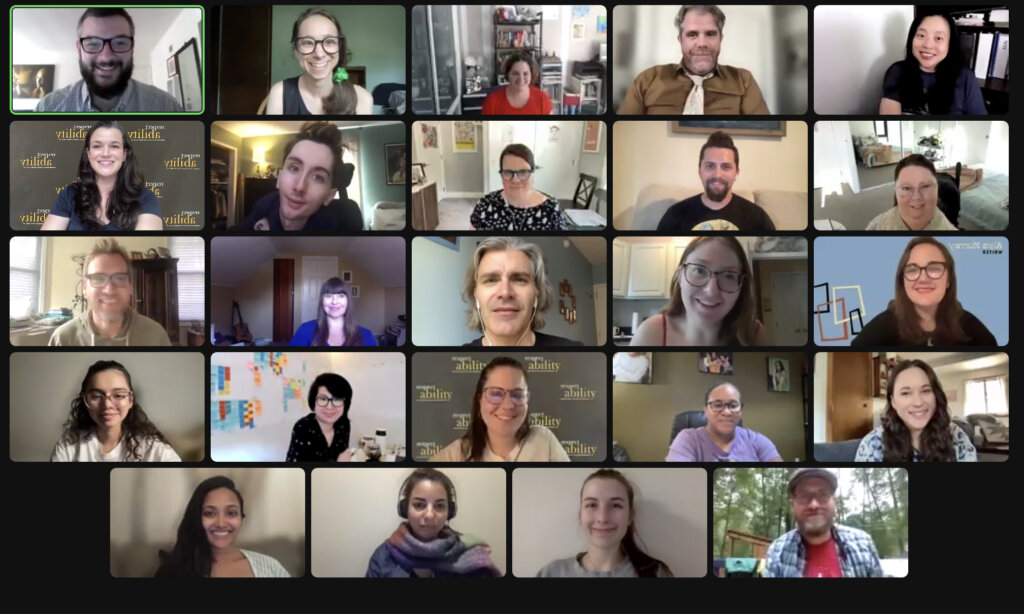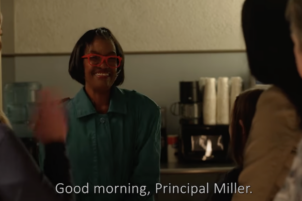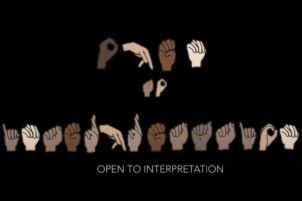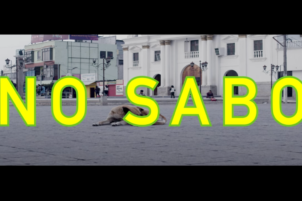
Disabled Film Writers (Top Row, L-R: Shea Mirzai, Amy Fox, Megan Metzger, Michael J. Dougherty, and Hyunjin Jo) speak to 2022 Virtual Cohort of the RespectAbility Entertainment Lab
Los Angeles, CA, Sept 1 – Feature writing is an important topic covered in the RespectAbility Entertainment Lab. As such, a panel of film writers joined the Lab this month to discuss tips for making it in the industry as disabled writers. The panel was moderated by Shea Mirzai, Co-Chair of the WGA’s Disabled Writers Committee, a four-time honoree of Franklin Leonard’s annual Blacklist and an alumnus of the 2020 RespectAbility Entertainment Lab as a Mid-Career/Mentor, as well as a Person who Stutters. Mirzai discussed the impact of his intersecting identities, including being a part of the LGBTQIA+ community as well as a first generation Iranian-American. The panelists included Megan Metzger, who is most known for writing Netflix’s The Princess Switch movie series; Michael J. Dougherty, an alumnus of the 2019 RespectAbility Entertainment Lab, screenwriter and founder of the Los Angeles ReelAbilities Film Festival who describes his work as dark; Amy Fox, who started out as a playwright, but transitioned to film, focusing on overlooked women who carved a space for themselves in careers dominated by men; and Hyunjin Jo, a writer, producer, and director who is known for writing adaptations.
The panelists stressed the importance reading has on one’s ability to be an effective writer. Mirzai shared his experience serving as Head of the Story Department at a now-defunct mini-major studio where he read thousands of scripts, many of which were not up to snuff.
“A huge benefit of that,” he says, “was I was able to figure out all the stuff that I shouldn’t be writing.”
Jo added the importance of reading a lot of screenplays, even “bad” ones, because recognizing bad writing patterns in someone else’s work can help a writer to not make the same mistakes.
Metzger discussed her experience writing a feature film for Netflix, saying “when you finally have your moment to prove that you are a fantastic writer…be ready to write a screenplay in two weeks,” adding that she wrote part of The Princess Switch 2 from the hospital. As the other panelists spoke about writing many scripts, Fox mentioned she teaches in addition to writing, saying she “comes to [writing] from a more artistic what-do-you-want-to-explore” angle.
Dougherty added, “You gotta write the thing that’s exactly you…the thing that points to your worldview the loudest.” He advises screenwriters to write “every single day.”
The conversation then turned to making connections in the industry. The panelists told the Lab Fellows that the Lab and other similar programs are the perfect place to make connections in the industry. Metzger said some of her biggest opportunities came from being friends with someone involved in a project.
The panelists then discussed the topic of disclosing disabilities. Mirzai said he was once terrified for people he worked with to find out that he stutters, but now “it’s a huge part of [his] identity and informs [his] writing.” Jo agreed that sharing one’s own life experience is a great way to market oneself to those doing the hiring, saying that it is important for them to hire writers that can “speak to the authenticity of the part.” Metzger emphasized that disabled people are “playing this game on hard mode,” which makes us adapt more easily. Fox, who has mostly hidden disabilities, says she was once told by an occupational therapist that her chronic tendonitis would make it impossible to work as a writer, but that her disabilities and the ableism she faces as a result of them helped her get creative and learn new ways to accomplish tasks. Dougherty acknowledged that not everyone may feel comfortable disclosing their disabilities, but in his experience, most people want to help ensure that a workplace is accessible. He reinforced the importance of advocating for one’s needs, an important skill for disabled people in every field.
RespectAbility’s fourth annual Lab for Entertainment Professionals with Disabilities brings authentic and diverse portrayals of people with disabilities to the screen by creating a pipeline of diverse professionals with disabilities behind the camera. Participants include people with physical, cognitive, sensory, mental health, and other disabilities. Lab alumni currently work for a variety of studio partners including DreamWorks Animation, Netflix, Nickelodeon, Paramount Pictures, Sony Pictures Entertainment, and The Walt Disney Company, as well as in a variety of writers’ rooms. Others have had films featured at festivals such as Cannes Short Film Festival, SXSW, Slamdance, and Tribeca, and participated in additional career track programs including with Film Independent and Sundance Institute.







